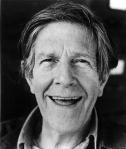My friend Stacey Bowers and I attended a concert at Carnegie Hall’s Zankel Hall which was called “collected stories: hero”. We especially went to see the second half of the concert which was a musical theater piece by Harry Partch (1901-1974) entitled “The Wayward” (1941-1943). Ever since I was in high school, which was a really long time ago, Harry Partch’s writings and lectures on music had planted the seed for my interest in instrument building and the sounds of ancient scales. Harry’s instruments are beautiful to look at and to hear. His music is corporeal and it’s important that the instruments, musicians and actors are all equal elements in his productions. This is why the instruments, musicians, actors and scenery are all on stage and not in a pit hidden from view.
What was especially amazing about this production was the fact that this work was premiered at Carnegie Hall in 1944, exactly 70 years ago to the day! Performances of Harry’s works are quite rare and maybe even more so now that Dean Drummond has passed away. Dean, a former assistant to Harry, ran a Partch program at Montclair State College in New Jersey for many years and had developed a great core of musicians to play this difficult music. At this time, it’s unknown where the instruments and the program will reside next. The leading authority on Partch and the custodian of the instruments, Danlee Mitchel resides in California.
Partch’s music uses a scale with 43 tones to the octave (the scale that is commonly used in Western music today has 12 tones). He uses only a part of his scale at any given time (often just five notes at a time) so his music sounds “normal” to the average listener but he has a palette of tones available to be able to reconstruct ancient scales and to accompany the small intervals of human speech when he wants. The Wayward is a collection of four of his works which are mostly based on texts written by “hobos” when Harry himself was travelling in boxcars during the depression days. The performance was absolutely stellar. The playing was fully charged and the soloists were exciting and very convincing. Composer David Lang curated the concert while the Partch performance was produced by “Bang On A Can”. The first half of this program was an amazing performance by Ben Bagby of Scenes from Beowulf in which he accompanied his singing and speaking (all by memory in Old English) on an authentic reproduction of a six stringed German harp.
As a warm up to this concert, we visited the Museum of Modern Art (MOMA) earlier to see the John Cage exhibit (There Will Never Be Silence: Scoring John Cage’s 4’33”) and an exhibition of new works by Jasper Johns. Perhaps Cage’s best known work 4’ 33”, otherwise known as his “silent” piece, was premiered right here in Woodstock, NY in August of 1952 at the nearly 100 year old Maverick Hall. When you first walk into the Cage exhibit, you’ll read about a concert that Cage did in 1943, one year before Partch’s Carnegie Hall concert!
This all-percussion concert was a huge success although he remained penniless for a long time after. The forties were an amazing period for percussion music which struggles even today for recognition in many musical circles.
MOMA’s website describes the Cage exhibit as follows: “Taking its title from a letter written by Cage in 1954, There Will Never Be Silence features prints, drawings, artists’ books, photographs, paintings, sculptures, and films by such artists as Marcel Duchamp, Kurt Schwitters, Robert Rauschenberg, Robert Morris, Lawrence Weiner, Yoko Ono, Andy Warhol, and other artists associated with Fluxus, Minimalism, and Conceptual art who pushed preconceived boundaries of space, time, and physicality to new ends.”
Partch and Cage were enormously influential to me. Read Partch’s book “Genesis of a Music” and Cage’s “Silence” and you may never be the same again. I can say with much certainty that I would not be doing what I do today if it weren’t for these two giants.




